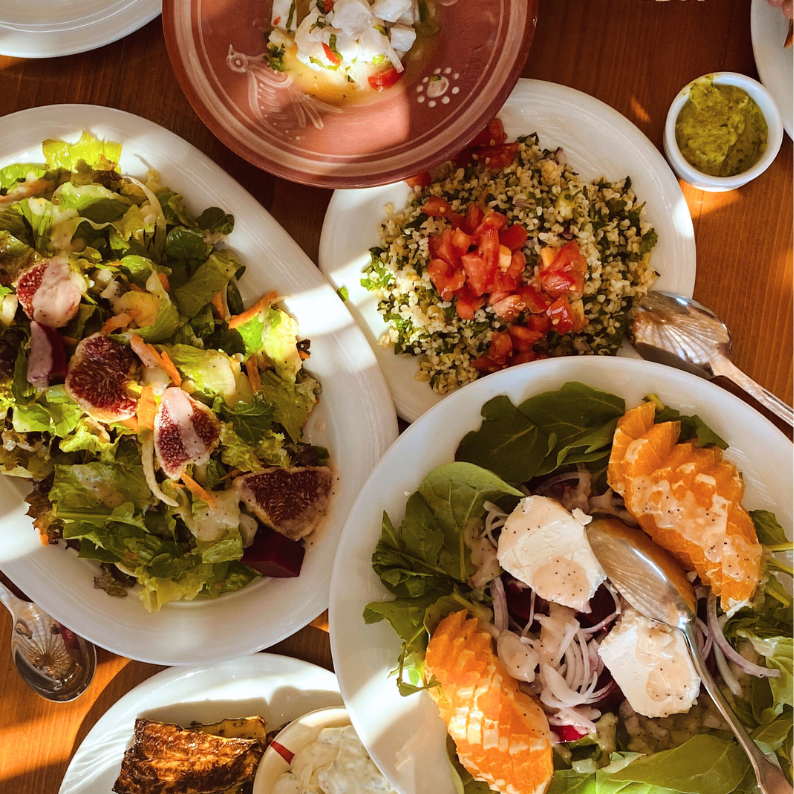Food is Part of How We Thrive: What I Learned Eating My Way Through the Mediterranean
I recently returned from a trip along the Mediterranean coast, and I can’t stop reflecting on how good I felt while I was there. It wasn’t just the beauty of the landscape or the slower pace of life—it was the food. The fresh, crusty bread from a local bakery. The vibrant vegetables in every meal. The abundance of olive oil, nuts, and fresh seafood. And plenty of time to savor each bite.
By the end of my trip, I was reminded of something important: food is not just fuel; it’s part of how we thrive. What we consume impacts our bodies, our minds, and even how we connect with others. When we treat food as a holistic part of our well-being, everything shifts.
Food is Medicine for the Body
We often hear the phrase "food is medicine," but what does that really mean? It means that the nutrients we put into our bodies directly affect how we feel, function, and even how we age.
In the Mediterranean, meals naturally include foods that science has repeatedly proven to support long-term health:
Healthy fats like olive oil, nuts, and seeds help reduce inflammation, support heart health, and nourish the brain.
Vegetables and fruits provide fiber, vitamins & minerals, and antioxidants that protect cells, facilitate organ and muscle function, and promote digestion.
Whole grains like farro, barley, and those found in freshly-baked whole wheat bread, offer sustained energy without the crash that comes from refined carbs.
Fresh seafood and lean proteins provide essential amino acids and omega-3s, supporting muscle repair and cognitive health.
Water and herbal teas keep the body hydrated, aiding in energy production, detoxification, and mood regulation.
Eating this way, I felt energized without the afternoon slump. My digestion was better, my skin was brighter, and I felt lighter—not because I was restricting anything, but because I was nourishing myself fully.
The Mind-Body Connection: How Food Impacts Mood
What we eat doesn’t just impact our physical health; it deeply affects our mental and emotional well-being.
Omega-3 fatty acids, found in fish like sardines and salmon, are linked to lower rates of depression and anxiety.
B vitamins, abundant in whole grains, legumes, and leafy greens, support neurotransmitter production, helping regulate your nervous system, improve your mood and prevent fatigue.
Fermented foods like yogurt and kefir provide probiotics that enhance gut health and since our gut produces much of our serotonin (our feel-good hormone), this can translate to better mood and emotional balance.
Magnesium-rich foods like nuts, seeds, and dark leafy greens help manage stress and improve sleep quality.
It’s no wonder I felt calm, focused, and happy abroad. I was fueling both my body and my mind.
Food and Connection: The Social Nourishment Factor
Food is not just about nutrients; it's about connection. In many Mediterranean cultures, meals are shared experiences. There’s a ritual of sitting together, passing plates, and savoring the flavors of a home-cooked meal.
This shared experience has its own health benefits:
Eating with others can lower stress levels and improve digestion.
Conversations over meals foster deeper social connections, which are linked to longevity and mental health.
Taking time to eat slowly, without screens or multitasking, helps the body properly process and digest foods, and absorb nutrients.
When we treat meals as moments of connection (with others, with ourselves, and with the ingredients on our plate), we're feeding more than just our stomachs. We're nourishing our sense of belonging and joy.
Bringing Mediterranean Wisdom Home
You don’t have to travel across the world to experience the benefits of this way of eating and living. Here are a few simple ways to bring these principles into your daily life:
Build your plate around plants. Start with vegetables and fruits, then add whole grains and proteins.
Embrace healthy fats. Cook with olive oil, snack on nuts, and add avocado to meals.
Prioritize hydration. Keep a water bottle nearby and swap sugary drinks for herbal teas.
Eat mindfully and socially. Step away from your desk for lunch. Share meals with family, friends, or coworkers whenever you can.
Choose fresh and simple. You don’t need fancy superfoods. Fresh, seasonal, and minimally processed foods go a long way.
Food as a Path to Thriving
At The Well Being, we believe that well-being is multi-dimensional, and food is a cornerstone of that journey. When we treat food not just as something to get through, but as something that helps us thrive, we start to feel more energized, more grounded, and more connected.
My time along the Mediterranean reminded me that wellness isn’t about deprivation or strict rules. It’s about nourishment in every sense of the word. So next time you sit down for a meal, ask yourself: Am I eating just to get through the day, or am I feeding myself in a way that helps me live fully?

